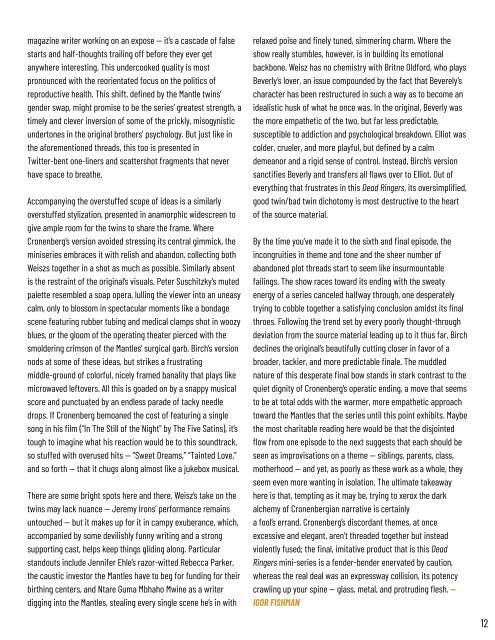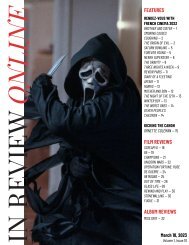InRO Weekly — Volume 1, Issue 16
You also want an ePaper? Increase the reach of your titles
YUMPU automatically turns print PDFs into web optimized ePapers that Google loves.
magazine writer working on an expose <strong>—</strong> it’s a cascade of false<br />
starts and half-thoughts trailing off before they ever get<br />
anywhere interesting. This undercooked quality is most<br />
pronounced with the reorientated focus on the politics of<br />
reproductive health. This shift, defined by the Mantle twins’<br />
gender swap, might promise to be the series' greatest strength, a<br />
timely and clever inversion of some of the prickly, misogynistic<br />
undertones in the original brothers' psychology. But just like in<br />
the aforementioned threads, this too is presented in<br />
Twitter-bent one-liners and scattershot fragments that never<br />
have space to breathe.<br />
Accompanying the overstuffed scope of ideas is a similarly<br />
overstuffed stylization, presented in anamorphic widescreen to<br />
give ample room for the twins to share the frame. Where<br />
Cronenberg’s version avoided stressing its central gimmick, the<br />
miniseries embraces it with relish and abandon, collecting both<br />
Weiszs together in a shot as much as possible. Similarly absent<br />
is the restraint of the original’s visuals. Peter Suschitzky’s muted<br />
palette resembled a soap opera, lulling the viewer into an uneasy<br />
calm, only to blossom in spectacular moments like a bondage<br />
scene featuring rubber tubing and medical clamps shot in woozy<br />
blues, or the gloom of the operating theater pierced with the<br />
smoldering crimson of the Mantles’ surgical garb. Birch’s version<br />
nods at some of these ideas, but strikes a frustrating<br />
middle-ground of colorful, nicely framed banality that plays like<br />
microwaved leftovers. All this is goaded on by a snappy musical<br />
score and punctuated by an endless parade of tacky needle<br />
drops. If Cronenberg bemoaned the cost of featuring a single<br />
song in his film (“In The Still of the Night'' by The Five Satins), it’s<br />
tough to imagine what his reaction would be to this soundtrack,<br />
so stuffed with overused hits <strong>—</strong> “Sweet Dreams,” “Tainted Love,”<br />
and so forth <strong>—</strong> that it chugs along almost like a jukebox musical.<br />
There are some bright spots here and there. Weisz’s take on the<br />
twins may lack nuance <strong>—</strong> Jeremy Irons’ performance remains<br />
untouched <strong>—</strong> but it makes up for it in campy exuberance, which,<br />
accompanied by some devilishly funny writing and a strong<br />
supporting cast, helps keep things gliding along. Particular<br />
standouts include Jennifer Ehle’s razor-witted Rebecca Parker,<br />
the caustic investor the Mantles have to beg for funding for their<br />
birthing centers, and Ntare Guma Mbhaho Mwine as a writer<br />
digging into the Mantles, stealing every single scene he’s in with<br />
relaxed poise and finely tuned, simmering charm. Where the<br />
show really stumbles, however, is in building its emotional<br />
backbone. Weisz has no chemistry with Britne Oldford, who plays<br />
Beverly’s lover, an issue compounded by the fact that Beverely’s<br />
character has been restructured in such a way as to become an<br />
idealistic husk of what he once was. In the original, Beverly was<br />
the more empathetic of the two, but far less predictable,<br />
susceptible to addiction and psychological breakdown. Elliot was<br />
colder, crueler, and more playful, but defined by a calm<br />
demeanor and a rigid sense of control. Instead, Birch’s version<br />
sanctifies Beverly and transfers all flaws over to Elliot. Out of<br />
everything that frustrates in this Dead Ringers, its oversimplified,<br />
good twin/bad twin dichotomy is most destructive to the heart<br />
of the source material.<br />
By the time you’ve made it to the sixth and final episode, the<br />
incongruities in theme and tone and the sheer number of<br />
abandoned plot threads start to seem like insurmountable<br />
failings. The show races toward its ending with the sweaty<br />
energy of a series canceled halfway through, one desperately<br />
trying to cobble together a satisfying conclusion amidst its final<br />
throes. Following the trend set by every poorly thought-through<br />
deviation from the source material leading up to it thus far, Birch<br />
declines the original’s beautifully cutting closer in favor of a<br />
broader, tackier, and more predictable finale. The muddled<br />
nature of this desperate final bow stands in stark contrast to the<br />
quiet dignity of Cronenberg’s operatic ending, a move that seems<br />
to be at total odds with the warmer, more empathetic approach<br />
toward the Mantles that the series until this point exhibits. Maybe<br />
the most charitable reading here would be that the disjointed<br />
flow from one episode to the next suggests that each should be<br />
seen as improvisations on a theme <strong>—</strong> siblings, parents, class,<br />
motherhood <strong>—</strong> and yet, as poorly as these work as a whole, they<br />
seem even more wanting in isolation. The ultimate takeaway<br />
here is that, tempting as it may be, trying to xerox the dark<br />
alchemy of Cronenbergian narrative is certainly<br />
a fool’s errand. Cronenberg’s discordant themes, at once<br />
excessive and elegant, aren’t threaded together but instead<br />
violently fused; the final, imitative product that is this Dead<br />
Ringers mini-series is a fender-bender enervated by caution,<br />
whereas the real deal was an expressway collision, its potency<br />
crawling up your spine <strong>—</strong> glass, metal, and protruding flesh. <strong>—</strong><br />
IGOR FISHMAN<br />
12
















